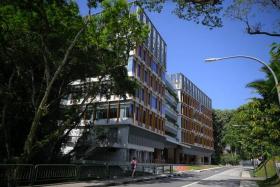S’pore studying safety of deploying nuclear energy
With limited options for renewable energy, Singapore is not ruling out the use of nuclear energy to cut emissions from its power sector while safeguarding the nation’s energy security – and the Republic is learning from the best minds in the field as part of the decision-making process.
The Straits Times understands that teams from government agencies in Singapore, such as the Energy Market Authority (EMA), have conducted visits to countries like the United States, United Kingdom and Germany to engage international organisations and partners on nuclear energy.
In response to queries, a spokesman for EMA said: “Given the technical complexity and ongoing developments in advanced nuclear energy and fusion technologies, Singapore is building capabilities to better understand the safety implications of deploying such technologies in small and densely populated countries.
“(This includes) engaging international organisations and partners to deepen our understanding of evolving nuclear technologies and facilitate information sharing.”
These organisations include the International Atomic Energy Agency, a United Nations agency that promotes the safe, secure and peaceful use of nuclear technologies; the UK Atomic Energy Authority, which researches fusion energy; and the Max Planck Institute in Germany.
The German institute houses the futuristic Wendelstein-7X – the world’s largest stellarator, an experimental reactor for nuclear fusion reactions.
The EMA spokesman added that Singapore is also working with regional neighbours through Asean platforms to build the region’s capabilities in nuclear safety and emergency preparedness and response.
“As an energy-disadvantaged country, Singapore has limited options for decarbonisation. To achieve net-zero emissions by 2050, Singapore’s electricity supply mix will need to evolve over the coming decades,” the spokesperson added, referring to Singapore’s aim of having the amount of planet-warming emissions it emits taper down to net zero by the middle of the century.
Currently, about 95 per cent of Singapore’s energy is generated from burning natural gas, a fossil fuel. Emissions from this sector make up about 40 per cent of the country’s total emissions.
“We need to study various low-carbon alternatives such as hydrogen, deep geothermal systems, biofuels and new forms of nuclear energy that could potentially enable Singapore to decarbonise the power sector in the longer term,” EMA added.
Get The New Paper on your phone with the free TNP app. Download from the Apple App Store or Google Play Store now

